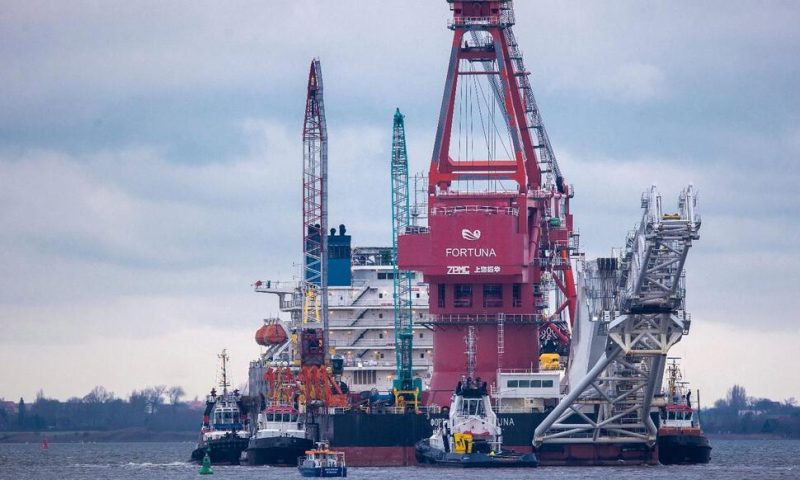The Biden administration has imposed new sanctions on three Russian ships and companies involved in constructing a controversial gas pipeline from Russia to Europe.
WASHINGTON — The Biden administration imposed new sanctions Friday on three Russian ships and companies involved in constructing a controversial gas pipeline from Russia to Europe.
The move comes as lawmakers from both parties criticize the administration for not doing enough to halt the Nord Stream 2 project. But it is unlikely to assuage the critics as it leaves in place sanctions exemptions against the Swiss-German company actually building the pipeline and its CEO.
The new sanctions target a Russian ship, the Ostap Sheremeta, involved in laying pipe for the project that is nearly complete; the Russian owner of another vessel, JSC Nobility; and the construction firm Konstanta OOO.
The sanctions notably do not target the Nord Stream AG firm, which is the project’s owner, or its top executives. The administration had earlier this year waived those sanctions, prompting severe pushback from members of Congress who believe the pipeline is a dangerous Russian power play. The administration maintains it opposes the project but says it is a fait accompli. It also says trying to stop it would harm relations with Germany.
Secretary of State Antony Blinken said: “Even as the administration continues to oppose the Nord Stream 2 pipeline, including via our sanctions, we continue to work with Germany and other allies and partners to reduce the risks posed by the pipeline to Ukraine and frontline NATO and EU countries and to push back against harmful Russian activities, including in the energy sphere.”
Friday’s announcement came just a month after the U.S and Germany reached a deal to allow Nord Stream 2′s completion without the imposition of U.S. sanctions on German entities.
Under the terms of the July 21 deal, the U.S. and Germany committed to countering any Russian attempt to use the Nord Stream 2 pipeline as a political weapon. And, they agreed to support Ukraine and Poland, both of which are bypassed by the project and fear Russia’s intentions, by funding alternative energy and development projects.
The Nord Stream 2 project has posed a major foreign policy dilemma for the Biden administration. U.S. officials from both parties have long feared that it would give Russia too much power over European gas supplies. But the pipeline is almost completed and the U.S. has been determined to rebuild ties with Germany that were damaged during the Trump administration.
Poland and Ukraine expressed their displeasure over the decision to allow the pipeline’s completion and said the efforts to reduce the Russian security threat were not sufficient.
Both Republicans and Democrats have assailed the administration’s approach, including Sen. Bob Menendez, D-N.J., the chairman of the Senate Foreign Relations Committee, and Sen. Jeanne Shaheen, D-N.H.
Texas Rep. Mike McCaul, the highest ranking Republican on the House Foreign Affairs Committee, said the Biden administration “continues to disregard the intent of congressionally mandated sanctions” by exempting some parties to the project. “Instead, the president has paved the way for this Russian malign influence project to become operational,” he said.
Sen. Ted Cruz, R-Texas, has gone so far as to block almost all of Biden’s nominees for senior State Department positions over the waivers. Cruz accused Biden of handing Russian President Vladimir Putin “a generational geopolitical victory everyday with his abject failure to stop the pipeline.”

